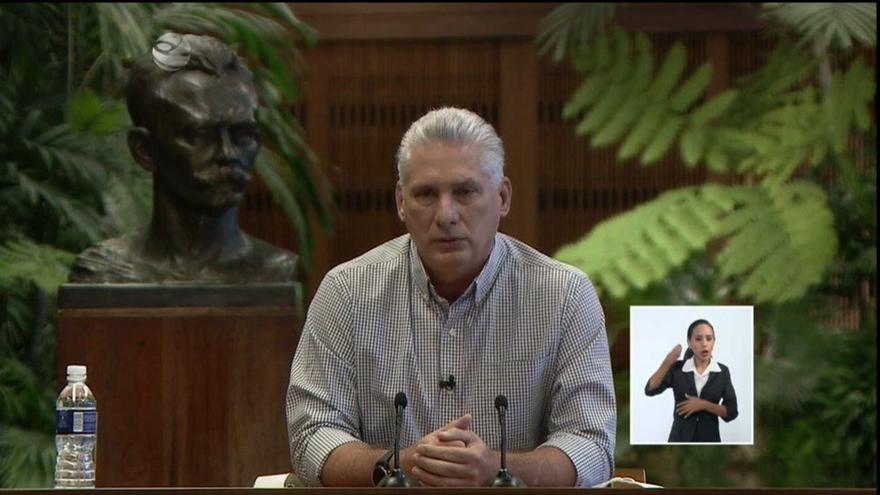
![]() 14ymedio, Havana, November 12, 2021–During a televised broadcast on Friday, announced only hours before, Miguel Díaz-Canel broached topics such as tourism and the pandemic, although the Civic March for Change scheduled for November 15th was the topic which generated the most interest during his long address in which he repeated on various occasions, the phrase “in peace” to define the current situation on the Island.
14ymedio, Havana, November 12, 2021–During a televised broadcast on Friday, announced only hours before, Miguel Díaz-Canel broached topics such as tourism and the pandemic, although the Civic March for Change scheduled for November 15th was the topic which generated the most interest during his long address in which he repeated on various occasions, the phrase “in peace” to define the current situation on the Island.
Upon learning of his appearance, speculations abounded: easing or tightening, said the betting pools, but Díaz-Canel opted to follow the official script. “We’re a Revolution that won’t survive the error of letting down our guard,” he underscored. “We’re a society closed to pressure,” although he did not repeat the questionable “combat order” he launched this past July 11th during the popular protests.
Without alluding to Archipiélago nor to playwright Yunior García Aguilera, principal organizer of the marches this Monday in several cities throughout the country, Díaz-Canel spoke of “an entire media intention, an imperial strategy to try to destroy the revolution,” something which “does not make us lose sleep” because “we’re prepared to defend the revolution.”
However, the greater part of this speech was directed at the difficult months of the pandemic and the possibility of economic recovery with the arrival of visitors upon the reopening of borders this coming Monday.
“We’ve been facing very hard situations and moments,” Díaz-Canel began saying in a broadcast which, despite having been announced as “live”, was pre-recorded, in which he spoke of “honoring and recognizing” the Cubans who lost their lives to the pandemic. “Cuba deserves a celebration,” the leader added.
“They tried to present us as a failed state,” he warned with regard to the critiques he received for the government’s handling of the worst moments of COVID-19. “We’re making a call to overcome it with our talent,” he underscored with regard to the U.S. embargo, the recurrent justification for the economic crisis the Island is experiencing.
“This is a time to harvest what we’ve sowed,” emphasized the 61-year-old engineer before taking a round of questions from the official press. “We cannot be sanguine,” stated the leader confronting the re-opening of borders although he emphasized that “we’ve controlled the disease.”
The reopening of borders is a topic that has generated mixed opinions. On the one hand, the economy on the Island urgently needs an influx of hard currency which will arrive with visitors; however, the unfortunate experience of the previous opening of flights at the end of last year and its negative epidemiological impact raises many suspicions.
“We are predicting that there will be an immediate increase in tourism but not an immediate recovery,” he recognized. “They will find a country at peace,” underscored Díaz-Canel in relation to travelers which, as of the middle of this month, will increase their presence in Cuban streets.
“Our economy will be recovering…in the midst of all these circumstances we’ve approved new economic actors. The approval of new ways of operating, both state and non-state, are flowing at a good pace…I’d say that framework sooner rather than later will result in a change in the services offered and goods available to our population.”
He maintained his optimism in that as of November 15th the flight sequence “will surpass 50.” In the remainder of the year, he estimated, “the number of tourists received will be almost 50% of those who have visited this year.”
And he did not fail to mention the repeated argument: “What we’ve faced has had an additional rigorous element, the cruel, criminal policy of Yankee imperialism against Cuba, which tried to take advantage of the moment where uncertainties also existed to tighten the screws of the blockade, to defame, to slander,” he repeated.
Regardless, in contrast to the speech he made on July 11th, a few hours after the first protests in which Díaz-Canel called on communists to take to the streets, on this occasion he avoided this type of call, although the reports point to increased repression against potential protesters in the last few days.
Translated by: Silvia Suárez
____________
COLLABORATE WITH OUR WORK: The 14ymedio team is committed to practicing serious journalism that reflects Cuba’s reality in all its depth. Thank you for joining us on this long journey. We invite you to continue supporting us by becoming a member of 14ymedio now. Together we can continue transforming journalism in Cuba.
